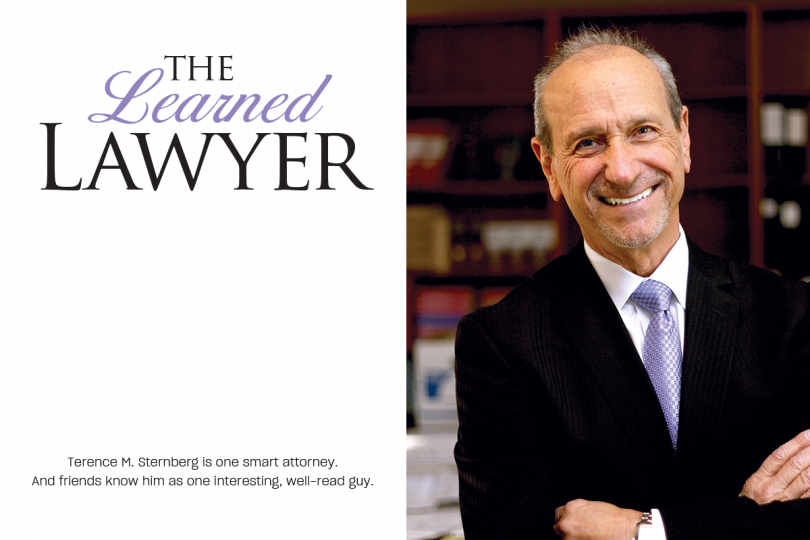Terence M. Sternberg is one smart attorney. And friends know him as one interesting, well-read guy.
Attorneys come in all different styles. Some are the “always wanted to be a lawyer” type. They studied political science, ran for student office in school, and knew what a tort was before most kids even knew what a law was. For others, it’s in their genes. Perhaps their mom and dad or aunt and uncle paved the way. Law was discussed, even encouraged while at home. Maybe they dabbled in business or psychology while in college, but law school was never far from the educational equation.
Terry Sternberg doesn’t fit either of these molds. In fact, one could argue he was an outlier, whose path to practice was less than traditional. There are many things Terry could have been great at. Students would love to have had a teacher like Terry. Patients would have loved a doctor or therapist like Terry. Frankly, if Terry delivered your mail, you’d invite him in for milk and cookies. He’s just that great.
IMMIGRANT BEGINNINGS—ONCE REMOVED TO L.A.
Terry grew up locally in Southern California. He boasts he’s “so L.A. that I was born next to the 101 freeway!” One of four boys, he was reared in home of conservative Jewish parents, who themselves were the children of immigrants.
“As a matter of tradition,” tells Terry, “I had to be a CPA, a doctor, or a lawyer. I’m not big on the sight of blood; I don’t faint, just not big on it! I’m not good at math. I was out of options, so law school it was.”
From that bit of family history, one may bet they know the rest of the story, but that wouldn’t be such a smart bet.
When conversations today turn to which college or university people attended, Terry is quick to say, “Hell, I didn’t complete the semester I enrolled in at Pasadena City College!”
Terry’s father operated quite a successful business, which Terry had high hopes of taking over some day. Stepping into the family business might have been a fast track for him right out of high school. Unfortunately for Terry, but fortunately for his future clients, Terry’s father told him he would have to earn a professional degree (law, medicine, or CPA) before he came to work at his business.
And the plot thickened. Shortly after high school, Terry and his sweetheart learned they would soon be parents, so life took a seriously unexpected turn. Terry would have to begin working and making money…immediately.
Things weren’t very promising for Terry to be able to go to college, and then to law school all while supporting a new young family. But back then in the 1970s, things were slightly different than they are today. It turns out that one was able to take the LSAT without any college, but just having passed a college equivalency test, which Terry did with flying colors.
He then went on to take the LSAT, and scored in the 94th percentile. As a result, Terry was accepted to Whittier Law School as a “special student”. In addition to this, to put himself through school and to support his new family, Terry worked as a paralegal. From there, Terry was able to complete his legal education and go on to pass the Bar Exam.
COUNSELOR STERNBERG
Terry’s tenure as a paralegal served several purposes. First, he earned a paycheck, which was paramount. He also got to witness the law in action. Paralegals typically work on many functions related to law such as legal research, document preparation, case and deposition summaries, etc. Terry also got to see how a law firm runs: learning about the people, positions, functions, duties, etc.
But possibly the most important thing Terry learned as a paralegal had absolutely nothing to do with the law. He learned that he was not cut out for a lifetime job at a large firm. So, after law school and the bar, Terry looked for a smaller more intimate firm to work at.
“My first job as an attorney,” tells Terry, “was with an attorney who’d left a very prestigious law firm to start his own practice. The training I received from him was critical to my success.”
Through his learnings, partly through his paralegal experience, partly through his first job as an attorney, and partly through his “thrill of battle,” Terry developed his specialties as a real estate and trust litigator. Today, Terry is recognized as a top litigator with not only outstanding skills as an attorney, but one who is masterful with client management.
“I think that one of the many ways I was blessed was with a still undiminished love of learning. …A love of what an artist can do with language naturally followed.”
“The trust cases are most taxing,” says Terry, “because the family dynamics that often come into play are very much like those in a divorce case.”
Terry’s clients come almost exclusively through referrals. He’s liked as a person, respected as a litigator, and given much praise by his clients.
“Terry can be kind in a brotherly or fatherly way,” tells one client, “or pretty tough like a Dutch Uncle. He can be fun and cordial when chatting, and a truly buttoned-up professional when he needs to be.”
Has his practice changed a lot over time? Not as much as one might think, but more like it’s evolved with time.
“The kind of real estate litigation I handle is relatively stable and the economics haven’t changed much,” tells Terry. “Trust litigation, by contrast, has for some time now been undergoing fairly significant and rapid change. It’s all a reflection of the societal changes we’ve seen driven by the graying baby-boomers, the less prosperous following generations, and the changes in family dynamics.”
While Terry gets referred smaller cases, he’s had his share of big ones too.
“My biggest case, in terms of the damages at stake,” said Terry, “involved a battle between two infertility practices followed by a battle between the two lead doctors, covering 5 years of litigation. We had court appearances and depositions here, in Nevada, Missouri, and Manhattan. We won the first round without a full trial but then my co-counsel on the first case became my opposing counsel on the second.”
Terry is quick to add, “We won the second case after a 3-week arbitration.”
A LAWYER’S LAWYER
Respect for Terry is not limited to his clients or family. Colleagues recognize the brains behind the beauty and are quick to volunteer comments like, “He’s very precise,” and “He’s a great lawyer!”
Gary Barr of Alpert, Barr & Grant is a fellow litigator and has found himself on both sides of the aisle from Terry. While they litigate the same type of cases, they have found themselves referring to each other consistently over the past 20 years. “We make each other better lawyers. We each bring our A-game and learn a lot from each other. If one of us likes the style or language the other uses in a case, we adopt it.” When asked how they keep their friendship intact when on opposing sides, Gary offers, “We could become bitter like our clients can get. But we will fight like hell for each of our clients, then leave it at the door. We never take it personally.”
“Terry never gets ruffled in court. He gets frustrated when other attorneys use sharp tactics or are disingenuous. But he never lets that show in the courtroom.”
GETTING PERSONAL OVER WORDS
So what makes this guy tick? He’s a young L.A. kid from a conservative family with immigrant history, and a guy who didn’t pick his path but was able to power through obstacles with not a lot of trouble.
One clue is his love of words and language. While it’s not clear if he liked school, it’s very apparent that Terry has always loved learning. And it’s not been learning to boast or brag, but rather to better understand the world around him.
“I think that one of the many ways I was blessed was with a still undiminished love of learning,” says Terry. “My parents did everything they could to encourage and support my love of reading. A love of what an artist can do with language naturally followed.” Gary Barr concurs. “He’s one of the most well-read people I’ve ever met.”
Books have had a significant and lasting impact on Terry from an early age. He was 13 when he read Profiles In Courage by John Fitzgerald Kennedy, whose story and charisma made him a likely hero for Terry. “He was young, bright, and brimming with optimism,” just as Terry himself was.
Today, Terry refers to other favorites books, such as The Great Gatsby, by F. Scott Fitzgerald which he first read in junior high school and has read numerous times since; The Prophet, by Kahlil Gibran, one of the most translated books in history, which he loves “for its sheer beauty and overwhelming power;” and the remarkable multi-volume biography The Years of Lyndon Johnson, by multi-time Pulitzer Prize winner Robert A. Caro.
Literature is not lost on his offspring, and now grandchildren. “I read a lot of books to them when they were younger. My older grandson devours a book in a day…or two if he’s moving slowly. The younger ones can’t compete with that, but all read and—amazingly—my son reads them historical fiction with life lessons.”
And that’s the final clue on what makes Terry not only a “learned” lawyer, but a loving husband, son, father, grandfather, and friend. Family means so much to Terry, and uncovers a soft underbelly, not always found on successful courtroom warriors.
Away from court and the office, Terry seeks a milder, simpler existence. He’s devoted to his wife, Ani. He’s a loving parent and grandparent. He is even servant to the king of their residence—their beloved Yorkie, Romeo. He is just as likely found in the garden as he is curled up with a book or watching an old movie.
“The older I get the fewer things really matter,” Terry tell us, “but those that do, matter that much more. For me today, it’s all about family: my 97 year-old mother, my four wonderful children, my three fantastic grandchildren, and my incredible wife. Everything else is window dressing.”










